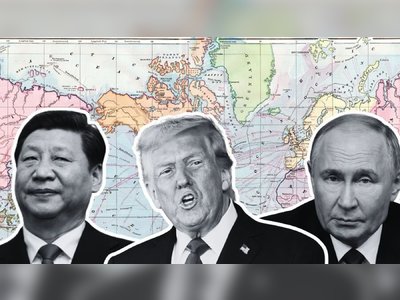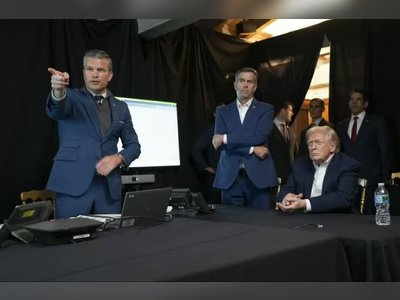Chinese Automakers Eye Volkswagen Factories Amid European Expansion Plans
Chinese firms seek to bypass EU tariffs by acquiring German manufacturing facilities
Chinese automobile manufacturers are actively seeking locations in Europe to establish production facilities and circumvent tariffs imposed by the European Commission.
The tariffs were introduced in response to what the Commission described as unfair subsidies in China.
Sources familiar with the strategies of Chinese automakers indicate a strong interest in acquiring factories in Germany, particularly those owned by Volkswagen, a symbol of German industrial prowess and a major player in the global automotive market.
This potential move follows increasing Chinese investments across various sectors in Germany, from telecommunications to robotics, although traditional automobile manufacturing collaborations are yet to be established.
Reports have emerged suggesting that the purchase of Volkswagen factories could strengthen China's influence within the prestigious German automotive industry, which is home to some of the world's oldest and most reputable car brands.
By producing cars in Europe, Chinese electric vehicle (EV) manufacturers could avoid European Union import tariffs on goods shipped from China, thus reinforcing their market position against European competitors.
This interest comes amid Volkswagen's efforts to restructure its German operations and to find alternative uses for its production facilities in Dresden and Osnabrück.
Consequently, Volkswagen has been exploring cost-reduction strategies, including factory closures.
As outlined in a recent agreement, production at Dresden, involving about 340 employees focused on manufacturing the electric ID.3, is set to cease in 2025. Similarly, production at Osnabrück, which employs approximately 2,300 workers to make the T-Roc Cabriolet, will halt in 2027.
Sources within Volkswagen have suggested openness to selling the Osnabrück plant to a Chinese buyer.
The company aims to find sustainable solutions that consider both corporate and employee interests.
Any potential purchase, however, faces scrutiny from German labor unions, which have significant influence over corporate decisions.
A representative from the union has expressed conditional support for producing vehicles for a Chinese joint venture, provided it adheres to Volkswagen's standards.
If successful, acquisitions by Chinese companies could prove politically sensitive given Germany's evolving stance towards Chinese investment.
Bilateral relations experienced significant growth under former Chancellor Angela Merkel, yet the current government is reassessing economic dependencies on China.
Foreign Minister Annalena Baerbock has described China as a strategic competitor, reflecting shifting policy priorities.
Industry analysts note that Volkswagen could find it economically preferable to sell rather than close its factories.
Estimates suggest the potential transaction could range from €100 to €300 million.
The sale is attracted by the opportunity for Chinese manufacturers to establish a foothold in Europe's largest economy.
Chinese firms like BYD, Leapmotor, and Chery Auto have already initiated production plans in countries like Hungary, Poland, and Spain, responding to commercial and geopolitical motivations.
While Chinese authorities remain active in reviewing international investments, the German government's forthcoming policies post-national elections could play a critical role in determining the outcome of such potential acquisitions.
As economic ties are reassessed, observers are attentive to how these developments will affect the landscape of the European automotive sector.
The tariffs were introduced in response to what the Commission described as unfair subsidies in China.
Sources familiar with the strategies of Chinese automakers indicate a strong interest in acquiring factories in Germany, particularly those owned by Volkswagen, a symbol of German industrial prowess and a major player in the global automotive market.
This potential move follows increasing Chinese investments across various sectors in Germany, from telecommunications to robotics, although traditional automobile manufacturing collaborations are yet to be established.
Reports have emerged suggesting that the purchase of Volkswagen factories could strengthen China's influence within the prestigious German automotive industry, which is home to some of the world's oldest and most reputable car brands.
By producing cars in Europe, Chinese electric vehicle (EV) manufacturers could avoid European Union import tariffs on goods shipped from China, thus reinforcing their market position against European competitors.
This interest comes amid Volkswagen's efforts to restructure its German operations and to find alternative uses for its production facilities in Dresden and Osnabrück.
Consequently, Volkswagen has been exploring cost-reduction strategies, including factory closures.
As outlined in a recent agreement, production at Dresden, involving about 340 employees focused on manufacturing the electric ID.3, is set to cease in 2025. Similarly, production at Osnabrück, which employs approximately 2,300 workers to make the T-Roc Cabriolet, will halt in 2027.
Sources within Volkswagen have suggested openness to selling the Osnabrück plant to a Chinese buyer.
The company aims to find sustainable solutions that consider both corporate and employee interests.
Any potential purchase, however, faces scrutiny from German labor unions, which have significant influence over corporate decisions.
A representative from the union has expressed conditional support for producing vehicles for a Chinese joint venture, provided it adheres to Volkswagen's standards.
If successful, acquisitions by Chinese companies could prove politically sensitive given Germany's evolving stance towards Chinese investment.
Bilateral relations experienced significant growth under former Chancellor Angela Merkel, yet the current government is reassessing economic dependencies on China.
Foreign Minister Annalena Baerbock has described China as a strategic competitor, reflecting shifting policy priorities.
Industry analysts note that Volkswagen could find it economically preferable to sell rather than close its factories.
Estimates suggest the potential transaction could range from €100 to €300 million.
The sale is attracted by the opportunity for Chinese manufacturers to establish a foothold in Europe's largest economy.
Chinese firms like BYD, Leapmotor, and Chery Auto have already initiated production plans in countries like Hungary, Poland, and Spain, responding to commercial and geopolitical motivations.
While Chinese authorities remain active in reviewing international investments, the German government's forthcoming policies post-national elections could play a critical role in determining the outcome of such potential acquisitions.
As economic ties are reassessed, observers are attentive to how these developments will affect the landscape of the European automotive sector.
AI Disclaimer: An advanced artificial intelligence (AI) system generated the content of this page on its own. This innovative technology conducts extensive research from a variety of reliable sources, performs rigorous fact-checking and verification, cleans up and balances biased or manipulated content, and presents a minimal factual summary that is just enough yet essential for you to function as an informed and educated citizen. Please keep in mind, however, that this system is an evolving technology, and as a result, the article may contain accidental inaccuracies or errors. We urge you to help us improve our site by reporting any inaccuracies you find using the "Contact Us" link at the bottom of this page. Your helpful feedback helps us improve our system and deliver more precise content. When you find an article of interest here, please look for the full and extensive coverage of this topic in traditional news sources, as they are written by professional journalists that we try to support, not replace. We appreciate your understanding and assistance.











